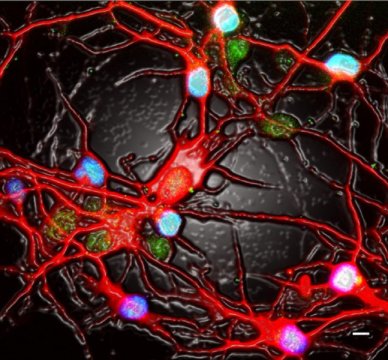Binge drinking in adolescence has been shown to have lasting effects on the wiring of the brain and is associated with increased risk for psychological problems and alcohol use disorder later in life. Now, researchers at the University of Illinois at Chicago Center for Alcohol Research in Epigenetics have shown that some of these lasting changes are the result of epigenetic changes that alter the expression of a protein crucial for the formation and maintenance of neural connections in the amygdala — the part of the brain involved in emotion,…
Read MoreCategory: Brain
Development of brain stem cells into new nerve cells and why this can lead to cancer
Stem cells are true Jacks-of-all-trades of our bodies, as they can turn into the many different cell types of all organs. This allows the tissues such as muscle or even brain to renew and to heal after injury. This amazing multipotency makes stem cells in the adult body key tools for the future of regenerative medicine. Scientists at the German Cancer Research Center (DKFZ) now publish in the journal Nature how brain stem cells make the decision to transform into new nerve cells. Ana Martin-Villalba and her research team at the German…
Read MoreWhat you eat could impact your brain and memory
You may be familiar with the saying, “You are what you eat,” but did you know the food you eat could impact your memory? Auriel Willette, assistant professor, and his team of researchers in Iowa State University’s Department of Food Science and Human Nutrition discovered a satiety hormone that, at higher levels, could decrease a person’s likelihood of developing Alzheimer’s disease. A paper outlining the results of their study recently was accepted for publication in Neurobiology of Aging. Using data from the Alzheimer’s Disease Neuroimaging Initiative (ADNI), the researchers looked at…
Read MoreSleep apnea creates gaps in life memories
People with sleep apnea struggle to remember details of memories from their own lives, potentially making them vulnerable to depression, new research has shown. Estimated to affect more than 936 million people worldwide, obstructive sleep apnea (OSA) is a serious condition that occurs when a person’s breathing is interrupted during sleep. People with OSA are known to suffer memory problems and also have higher rates of depression but it is not well understood how these issues are connected with the development of the disease. The new study led by RMIT…
Read MoreWhen neurons get the blues
When neurons get the blues. This artistic image shows neurons derived from pluripotent stem cells of antidepressant (SSRI) resistant depressed patients. SSRI-resistant patient neurons display hyperactivity in response to serotonin. The study reveals potential mechanism associated with SSRI-resistance in major depressive disorder (MDD). The most commonly prescribed antidepressants, selective serotonin reuptake inhibitors (SSRIs), lift the fog of depression for many people. But for around a third of people with major depressive disorder, SSRIs don’t make much of a difference. Now, researchers from the Salk Institute have pinned down a possible…
Read More




